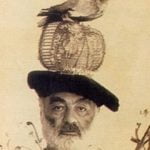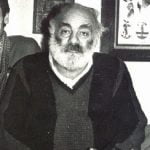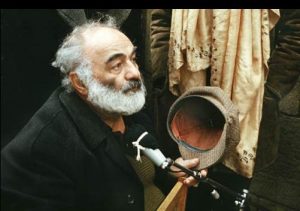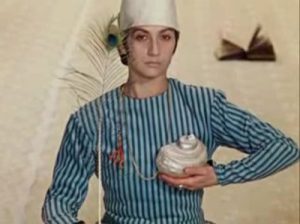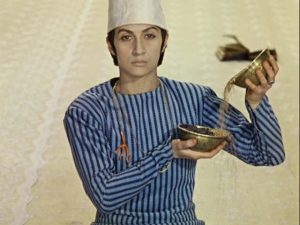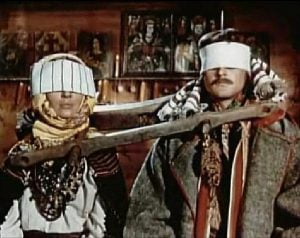Sergei Parajanov was an Armenian film director, artist and screenwriter who made significant contribution to world cinema with his films.
Sergei Parajanov (Սերգեյ Փարաջանյան; Сергей Иосифович Параджанов;) was born on the January 9, 1924, in Tbilisi, Georgia, USSR, to an ethnic Armenian family. His father was Iosif Parajanian and his mother was Siranush Bejanian.
In 1945 Parajanov traveled to Moscow and entered the directing department at VGIK, one of the oldest and most highly respected film schools in Europe, and studied under director Igor Savchenko and later Aleksandr Dovzhenko in Kiev, Ukraine. Parajanov moved to Kiev, where after a few documentaries (Dumka (1957), Zolotye ruki (1957), Natalya Ushviy (1957)) and several narrative films (Andriesh (1954), Ukrainian Rhapsody (1961), Tsvetok na kamne (1962)) he created the magnificent “Shadows of Forgotten Ancestors”, which won countless international awards, including the British Academy Award. The success of “Shadows of Forgotten Ancestors” was compared to that of the super influential Battleship Potemkin (1925); however, “Shadows of Forgotten Ancestors” didn’t conform to the standards of Soviet cinema and Parajanov was immediately blacklisted.
He left for Armenia to film the documentary Hakob Hovnatanyan (1967), and then in 1968 he created “Sayat Nova”, his masterpiece. “Sayat Nova” was banned by Soviet authorities, re-edited and re-named “The Color of Pomegranate”. In December of 1973, the Soviet government arrested Parajanov and sentenced him to five years in hard labor camps. A large group of world-famous artists, filmmakers and activists protested and Parajanov was released, but only after having served four horrific years in the Soviet penal system. Poet Louis Aragon’s petition to the Soviet government was instrumental in securing Parajanov’s release.
The Colour of Pomegranates
Parajanov returned to Tbilisi, but the regime continued to keep him away from cinema. During and after prison Paradjanov created extraordinary collages, drawings and numerous other art works, now frequently exhibited worldwide. In 1984, however, political conditions started to change and, with the help of Georgian intellectuals, the government allowed Parajanov to create the multi-award winning The Legend of Suram Fortress (1986) – 15 long years after “Sayat Nova”.
Shadows of Our Forgotten Ancestors
In 1986 Parajanov made yet another multi-award winning film, Ashik Kerib (1988), based on a tale by Mikhail Lermontov, and dedicated the film to his friend Andrey Tarkovskiy.
The Legend of Suram Fortress
Sergey Prajanov passed away in July of 1990, leaving his final masterpiece “The Confession” unfinished. It survives in its original negative in Parajanov: The Last Spring (1992) by his closest friend Mikhail Vartanov.
Filmography
1951 Moldavian Tale – (Russian) Молдавская сказка Moldavskaya Skazka Graduate short film. Lost.
1954 Andriesh – (Russian) Андриеш Andriesh Co-directed with Yakov Bazelyan. Feature-length remake of Moldavian Tale.
1958 Dumka – (Ukrainian) Думка Dumka Documentary.
1958 The First Lad (aka The Top Guy) – (Russian) Первый парень Pervyj paren
1959 Natalya Ushvij – (Russian) Наталия Ужвий Natalia Uzhvij Documentary.
1960 Golden Hands -(Russian) Золотые руки Zolotye ruki Documentary.
1961 Ukrainian Rhapsody – (Russian) Украинская рапсодия Ukrainskaya rapsodiya
1962 Flower on the Stone – (Russian) Цветок на камне Tsvetok na kamne
1964 Shadows of Forgotten Ancestors -(Ukrainian) Тіні забутих предків Tini zabutykh predkiv
1965 Kyiv Frescoes – (Russian) Киевские фрески Kievskie Freski Banned during pre-production. 15 minutes of auditions survive.
1967 Hakop Hovnatanian – (Armenian) Հակոբ Հովնաթանյան Hakob Hovnatanyan Documentary. Short.
1968 The Color of Pomegranates (aka Sayat Nova) – (Armenian) Սայաթ-Նովա Sayat Nova
1968 Children to Komitas – (Armenian) Երեխաներ Կոմիտասին Yerekhaner Komitasin Documentary for UNICEF. Lost (?).
1984 The Legend of Suram Fortress (Georgian) ამბავი სურამის ციხისა Ambavi Suramis tsikhisa
1985 Arabesques On The Pirosmani Theme (Russian) Арабески на тему Пиросмани Arabeski na temu Pirosmani Documentary. Short.
1988 Ashik Kerib – (Georgian) აშიკი ქერიბი Ashiki Keribi
1989–1990 The Confession – (Armenian) Խոստովանանք Khostovanank Unfinished; original negative survives in Parajanov: The Last Spring (1992)


